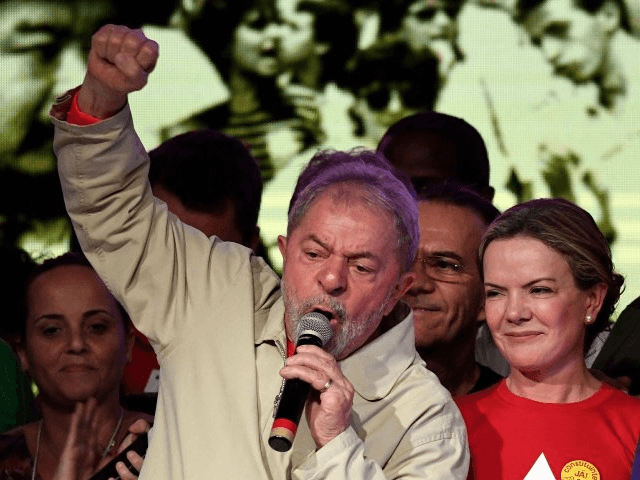Luiz Inácio Lula da Silva, Brazil’s socialist former president recently cleared to run for president again despite a million-dollar corruption conviction, said in an interview published Wednesday he would run for president again only if he was all but guaranteed a win.
Lula — who presided over the country from 2003 to 2011 and spearheaded a dramatic diplomatic shift that brought the country closer to China, Russia, and other rogue states — was imprisoned in 2018 on charges of having redirected public funds to the purchase of a luxury beachfront property while president. Brazilian courts ultimately sentenced him to 25 years in prison over his abuse of power; his conviction disqualified him from ever running for office again. In March, however, the nation’s Supreme Federal Tribunal (STF), made up largely of his own appointees, overturned the conviction on a technicality, arguing the court initially convicting him did not have jurisdiction on the matter.
While the case is processed once more upon remand, Lula is free and technically allowed to run for any office, including president. Brazil is scheduled to have its next presidential election in 2022.
In an interview published Wednesday with the French magazine Paris Match — which the magazine claimed was an exclusive declaration of candidacy by the Brazilian leftist — Lula said he would “not hesitate” to run for president again, but only if he was “in the best position to win the presidential election and in good health.” Lula is 75 years old.
“I think I was a good president. I forged strong ties with Europe, South America, Africa, the United States, China, Russia,” Lula continued. “Under my mandate, Brazil has become an important player on the world stage, notably creating bridges between South America, Africa, and the Arab countries, with the aim of establishing and strengthening a South-South relationship and demonstrate that the geopolitical predominance of the North was not inexorable.”
Lula’s tenure as president was marked by arguably the world’s biggest corruption scandal and his insistence on having Brazil foot the bill for massive global sporting events, including both the Summer Olympic Games and the FIFA World Cup. The former has come to be known as “Operation Car Wash” because police investigators first discovered it through the use of a small car wash in southern Curitiba to launder money. Investigators uncovered a national web of corruption mostly fueled by politicians of nearly every political party receiving bribes from contracting firms — most prominently the disgraced firm Odebrecht — in exchange for lucrative contracts for infrastructure projects with the state. The firms would overcharge the government and kick back some of the excess taxpayer funds to the politicians who made the deal possible. Most of the exchanges unveiled occurred while Lula was president.
The STF overturned Lula’s conviction because it came from the main court processing “Operation Car Wash” in Curitiba — about 250 miles from the Sao Paulo luxury triplex apartment he was convicted of illicitly purchasing. The judge presiding over that court, Sergio Moro, received wide public acclaim for the many convictions his court handed down but also became the subject of attacks from the left, which accused him of being inherently biased against Lula.
In addition to the vast state expenditures exacerbated by “Operation Car Wash” overcharges, Brazil hosted the Olympics and the World Cup in 2016 and 2014, respectively, as a result of the Lula government clinching hosting duties. Both events cost millions of dollars, devastating the economy and leaving the country with tremendous debt, little to pay its essential public workers, and explosive public ire. Prosecutors later found that corruption and bribery were at the core of operations to ensure the functioning of the Rio Olympics.
The 2014 World Cup was also a morale tragedy for the country; Brazil, the winningest team in World Cup history, lost in a semifinal to Germany 7-1.
Lula’s potential return to presidential politics comes as current President Jair Bolsonaro, who rode the wave of public outrage surrounding Lula-era corruption to the presidential palace, sees some of the lowest approval ratings in his tenure. Bolsonaro has struggled to contain the Chinese coronavirus pandemic in the country, opposing lockdowns and quarantine measures and repeatedly telling Brazilians not to fear the virus. Brazil has documented over 15 million coronavirus cases since the pandemic began and more deaths than any country save the United States – not counting potentially higher, but unofficial, death counts from rogue states like China and Iran.
A poll by the left-leaning Datafolha firm released on May 12 found that Lula would decisively win against Bolsonaro in a presidential election held currently. Brazil’s election system requires a presidential candidate to earn over 50 percent of the vote to win an election on the first round; if no candidate receives over half the votes, the top two candidates go on to a run-off election where the one with the greater number of votes wins.
According to the Datafolha poll, Lula would receive 41 percent of votes in a first round, compared to 23 percent who would vote for Bolsonaro. In a run-off, the poll found that over half, 55 percent, would vote for Lula over Bolsonaro. Bolsonaro performs significantly better against Lula than other potential candidates, such as Sao Paulo governor Joao Doria. The poll found that, in a first round, the total number of votes for all other candidates is six points higher than support for Lula, suggesting that a narrower field may hurt the socialist.

COMMENTS
Please let us know if you're having issues with commenting.